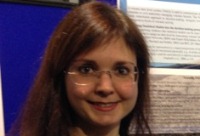Volcano research makes Lloyd’s shortlist

Dr Carina Fearnley at the Lloyd’s Science of Risk Research Prize 2013 ceremony
12 December 2013
Dr Carina Fearnley from the Department of Geography and Earth Sciences was one of five candidates to have been shortlisted for the annual Lloyd’s Science of Risk Research Prize this year, which focused on human elements of risk.
Dr Fearnley, a lecturer in Environmental Hazards at Aberystwyth, made the shortlist under the 'Behavioural Risk' category and looks at the decision-making processes involved when assigning a volcano alert level and the complexity and risk involved in the process.
Her research looks at Disaster Risk Reduction, and focuses on the role of understanding and communicating uncertainty, risk, and complexity to develop resilience to natural and environmental hazards.
Using interviews conducted from 2007 to 2009 at five US Geological Survey volcano observatories in Alaska, Cascades, Hawaii, Long Valley, and Yellowstone, Dr Fearnley established that warning decisions are not just based on science, but also the social context in which the crises occurs.
Dr Fearnley explains, “This research presents the first analysis of the decision-making processes involved in assigning a warning in a volcano alert level system within different groups involved in a crisis such as the scientists, emergency responders, and policy makers.
“It is hoped from this research a greater understanding about how hazard and risk assessment and communication for natural hazards occurs in practice, so to reduce loss of life and socio-economic impact on vulnerable communities in the future.
“I was delighted to be shortlisted as this places recognition on the value of doing interdisciplinary work, and the benefit this can bring not only to the insurance sector, but across many individuals and organisations involved in natural hazards.
“It is my belief that interdisciplinary work can provide enormous benefit to problems that society face today that traditional disciplines cannot address alone by bringing together the wealth of knowledge and techniques of different disciplines so that a better understanding of the problems can be developed, and consequently effective solutions found.”
AU44413



